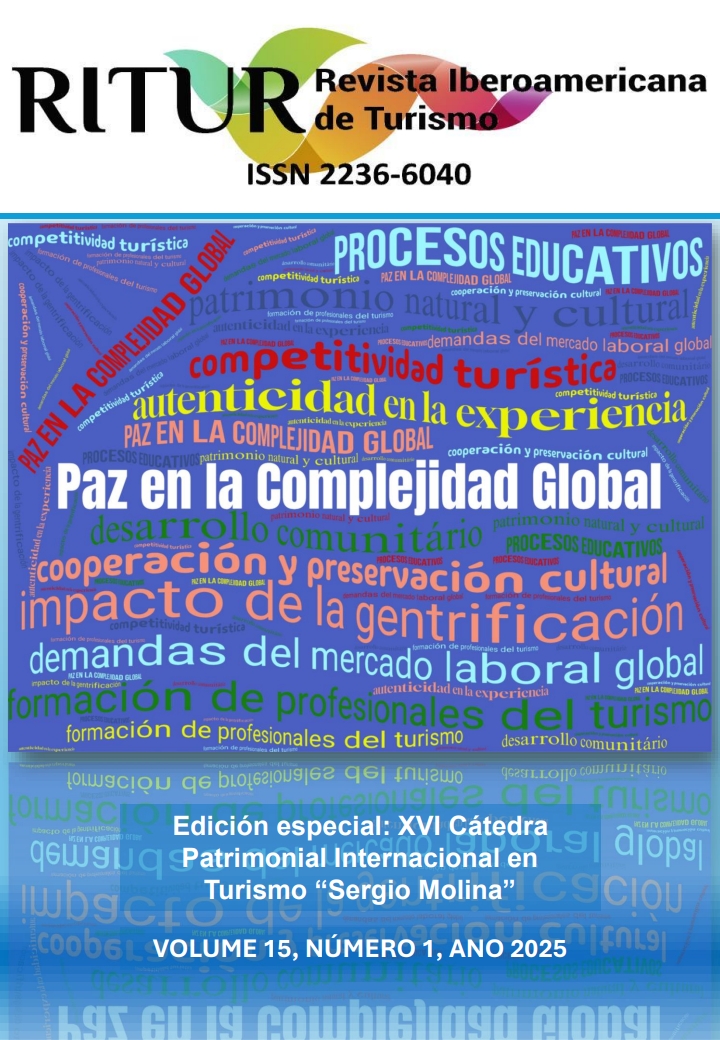Sustainable tourism competitiveness: reflections from theory and practice
DOI:
https://doi.org/10.28998/ritur.V15.N1.A2025.pp21-33.18761Keywords:
Tourism Competitiveness, Sustainability, Technological innovation, Cultural Preservation, GovernanceAbstract
Tourism competitiveness is a crucial factor for the sustainable development of destinations in a globalized environment. This article examines trends in its approach from both theoretical and practical perspectives, integrating a review of recent literature with findings from an interdisciplinary panel conducted during the XVI International Patrimonial Chair in Tourism "Sergio Molina". The panel brought together key stakeholders from academic, governmental, and business sectors, who offered insights into strategies and challenges related to tourism competitiveness. Using a qualitative approach based on grounded theory, key categories were identified, including sustainability, technological innovation, cooperation and governance, education and cultural preservation, and the quality of the visitor experience.
The results underscore that sustainability serves as a central axis connecting multiple dimensions, fostering responsible practices that encompass both environmental conservation and the social and economic inclusion of local communities. Technological innovation emerges as a strategic tool for modernization and global visibility, although it must be balanced with the authenticity and quality of tourism experiences. Similarly, collaborative cooperation and governance are highlighted as essential pillars for coordinating intersectoral efforts and addressing challenges such as overtourism. Finally, the quality of the visitor experience and education play pivotal roles in cultural preservation and in strengthening the identity of destinations.
This article concludes that an integrated approach—grounded in sustainability, balanced innovation, and ethics—is vital to enhancing tourism competitiveness. Moreover, it outlines directions for future research to deepen the understanding of these factors and their practical application in designing strategies for more competitive and responsible tourism.
Downloads
References
Alcocer, A. (2013). Competitividad en el sector turístico: una revisión de la literatura. Revista Lebret (5). 271-297.
Aguiar-Bardosa, A. y Chim-Miki, A. (2024). Indicators for tourism competitiveness from the society´s perspective: A Delphi Study. Tourism Planning & Development, 21(4), 394-415, DOI: 10.1080/21568316.2022.2069850
Aguiar, J., Fischmann, A., y Kramer B. (2024). Tourism competitiveness and social progress: A systematic literatura review. Journal of Hopitality and Tourism Management, 59, 309-323.
Carrasco, S., y Lugo, E. (2023). Gestión del conocimiento como herramienta para la competitividad turística: una revisión de literatura. https://doi.org/10.21892/9786287515413.3
Chávez, A., & Enríquez, J. (2024). Análisis regional de la competitividad turística en Puerto Peñasco, Sonora, México. Una visión de los actores locales. Estudios Sociales. Revista de Alimentación Contemporánea y Desarrollo Regional, 34(63), 2-26.
Crouch, G. I., y Ritchie, J. R. B. (1997). Destination competitiveness and the role of the tourism enterprise. En Proceedings of the Fourth Annual Business Congress. Presentado en Fourth Annual Business Congress, Estambul. Disponible en: http://www.ucalgary.ca/files/haskaynefaculty/95.19.pdf
Dwyer, L., y Kim, C. (2003). Destination Competitiveness: a model and determinants. Current issues in tourism, 6(5).
Garcés, Y., Sarmiento, Y. Paneca, Y. (2018). La competitividad turística: su medición y factores determinantes. Revista Caribeña de Ciencias Sociales, (junio 2018). En línea:
//www.eumed.net/rev/caribe/2018/06/competitividad-turistica.html
Kumar, S., Kumar, D., y Nicolau, J. (2024). How does culture influence a country’s travel and tourism competitiveness? A longitudinal frontier study on 39 countries. Tourism Management, (100), 1-16. https://doi.org/10.1016/j.tourman.2023.104822.
Maksimilianus, A., Abubakar, F., y Indriyani, S. (2024). Analysis of Tourism Competitiveness Reviewd from the Perspective of Government Policy, Business Actors and Local Culture. INNOVATIVE: Journal of Social Science Research, 4(4), 6255-6262.
Porter, M. E. (1990). The competitive advantage of nations. Harvard Business Review. Disponible en: http://kkozak.wz.cz/Porter.pdf
Ramos, C., & Pinto, K. (2024). How Gastronomic Image shapes Destination Competitiveness: An Approach with Sentiment Analysis. Appl. Sci. 2024, 14, 2-19. https://
doi.org/10.3390/app14209524
Song, H., & Xu, W. (2024). Evaluation Model of Tourism Competitiveness in the context of Sustainable Development. Frontiers in Public Health, 1-14. doi: 10.3389/fpubh.2024.1396134
Downloads
Published
How to Cite
Issue
Section
License
Copyright (c) 2025 RITUR - Revista Iberoamericana de Turismo

This work is licensed under a Creative Commons Attribution-NonCommercial-ShareAlike 4.0 International License.
Autores que publicam nesta revista concordam com os seguintes termos:
- Os Autores mantém os direitos autorais e concedem à revista o direito de publicação simultaneamente disponibilizada de acordo com uma Licença Creative Commons 4.0 Brasil, permitindo o compartilhamento sem fins lucrativos de sua obra pelo seu uso/citação de modo referenciado (com reconhecimento da autoria e publicação nesta revista).



















